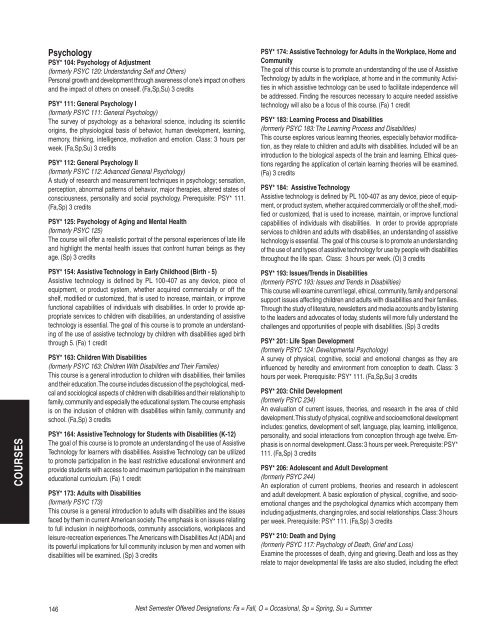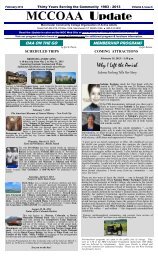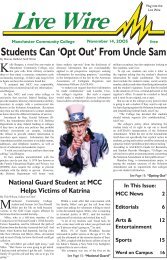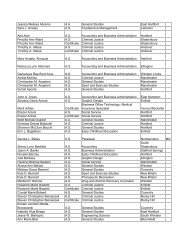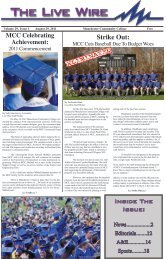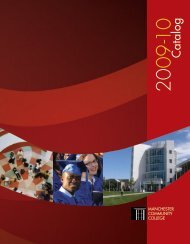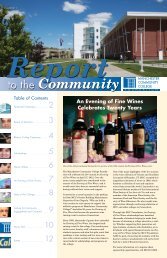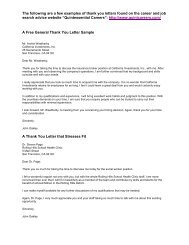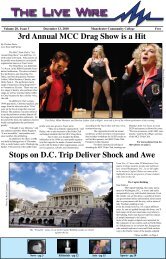Liberal Arts and Science - Manchester Community College ...
Liberal Arts and Science - Manchester Community College ...
Liberal Arts and Science - Manchester Community College ...
You also want an ePaper? Increase the reach of your titles
YUMPU automatically turns print PDFs into web optimized ePapers that Google loves.
COURSES<br />
Psychology<br />
PSY* 104: Psychology of Adjustment<br />
(formerly PSYC 120: Underst<strong>and</strong>ing Self <strong>and</strong> Others)<br />
Personal growth <strong>and</strong> development through awareness of one’s impact on others<br />
<strong>and</strong> the impact of others on oneself. (Fa,Sp,Su) 3 credits<br />
PSY* 111: General Psychology I<br />
(formerly PSYC 111: General Psychology)<br />
The survey of psychology as a behavioral science, including its scientific<br />
origins, the physiological basis of behavior, human development, learning,<br />
memory, thinking, intelligence, motivation <strong>and</strong> emotion. Class: 3 hours per<br />
week. (Fa,Sp,Su) 3 credits<br />
PSY* 112: General Psychology II<br />
(formerly PSYC 112: Advanced General Psychology)<br />
A study of research <strong>and</strong> measurement techniques in psychology; sensation,<br />
perception, abnormal patterns of behavior, major therapies, altered states of<br />
consciousness, personality <strong>and</strong> social psychology. Prerequisite: PSY* 111.<br />
(Fa,Sp) 3 credits<br />
PSY* 125: Psychology of Aging <strong>and</strong> Mental Health<br />
(formerly PSYC 125)<br />
The course will offer a realistic portrait of the personal experiences of late life<br />
<strong>and</strong> highlight the mental health issues that confront human beings as they<br />
age. (Sp) 3 credits<br />
PSY* 154: Assistive Technology in Early Childhood (Birth - 5)<br />
Assistive technology is defined by PL 100-407 as any device, piece of<br />
equipment, or product system, whether acquired commercially or off the<br />
shelf, modified or customized, that is used to increase, maintain, or improve<br />
functional capabilities of individuals with disabilities. In order to provide appropriate<br />
services to children with disabilities, an underst<strong>and</strong>ing of assistive<br />
technology is essential. The goal of this course is to promote an underst<strong>and</strong>ing<br />
of the use of assistive technology by children with disabilities aged birth<br />
through 5. (Fa) 1 credit<br />
PSY* 163: Children With Disabilities<br />
(formerly PSYC 163: Children With Disabilities <strong>and</strong> Their Families)<br />
This course is a general introduction to children with disabilities, their families<br />
<strong>and</strong> their education. The course includes discussion of the psychological, medical<br />
<strong>and</strong> sociological aspects of children with disabilities <strong>and</strong> their relationship to<br />
family, community <strong>and</strong> especially the educational system. The course emphasis<br />
is on the inclusion of children with disabilities within family, community <strong>and</strong><br />
school. (Fa,Sp) 3 credits<br />
PSY* 164: Assistive Technology for Students with Disabilities (K-12)<br />
The goal of this course is to promote an underst<strong>and</strong>ing of the use of Assistive<br />
Technology for learners with disabilities. Assistive Technology can be utilized<br />
to promote participation in the least restrictive educational environment <strong>and</strong><br />
provide students with access to <strong>and</strong> maximum participation in the mainstream<br />
educational curriculum. (Fa) 1 credit<br />
PSY* 173: Adults with Disabilities<br />
(formerly PSYC 173)<br />
This course is a general introduction to adults with disabilities <strong>and</strong> the issues<br />
faced by them in current American society. The emphasis is on issues relating<br />
to full inclusion in neighborhoods, community associations, workplaces <strong>and</strong><br />
leisure-recreation experiences. The Americans with Disabilities Act (ADA) <strong>and</strong><br />
its powerful implications for full community inclusion by men <strong>and</strong> women with<br />
disabilities will be examined. (Sp) 3 credits<br />
146<br />
PSY* 174: Assistive Technology for Adults in the Workplace, Home <strong>and</strong><br />
<strong>Community</strong><br />
The goal of this course is to promote an underst<strong>and</strong>ing of the use of Assistive<br />
Technology by adults in the workplace, at home <strong>and</strong> in the community. Activities<br />
in which assistive technology can be used to facilitate independence will<br />
be addressed. Finding the resources necessary to acquire needed assistive<br />
technology will also be a focus of this course. (Fa) 1 credit<br />
PSY* 183: Learning Process <strong>and</strong> Disabilities<br />
(formerly PSYC 183: The Learning Process <strong>and</strong> Disabilities)<br />
This course explores various learning theories, especially behavior modification,<br />
as they relate to children <strong>and</strong> adults with disabilities. Included will be an<br />
introduction to the biological aspects of the brain <strong>and</strong> learning. Ethical questions<br />
regarding the application of certain learning theories will be examined.<br />
(Fa) 3 credits<br />
PSY* 184: Assistive Technology<br />
Assistive technology is defined by PL 100-407 as any device, piece of equipment,<br />
or product system, whether acquired commercially or off the shelf, modified<br />
or customized, that is used to increase, maintain, or improve functional<br />
capabilities of individuals with disabilities. In order to provide appropriate<br />
services to children <strong>and</strong> adults with disabilities, an underst<strong>and</strong>ing of assistive<br />
technology is essential. The goal of this course is to promote an underst<strong>and</strong>ing<br />
of the use of <strong>and</strong> types of assistive technology for use by people with disabilities<br />
throughout the life span. Class: 3 hours per week. (O) 3 credits<br />
PSY* 193: Issues/Trends in Disabilities<br />
(formerly PSYC 193: Issues <strong>and</strong> Trends in Disabilities)<br />
This course will examine current legal, ethical, community, family <strong>and</strong> personal<br />
support issues affecting children <strong>and</strong> adults with disabilities <strong>and</strong> their families.<br />
Through the study of literature, newsletters <strong>and</strong> media accounts <strong>and</strong> by listening<br />
to the leaders <strong>and</strong> advocates of today, students will more fully underst<strong>and</strong> the<br />
challenges <strong>and</strong> opportunities of people with disabilities. (Sp) 3 credits<br />
PSY* 201: Life Span Development<br />
(formerly PSYC 124: Developmental Psychology)<br />
A survey of physical, cognitive, social <strong>and</strong> emotional changes as they are<br />
influenced by heredity <strong>and</strong> environment from conception to death. Class: 3<br />
hours per week. Prerequisite: PSY* 111. (Fa,Sp,Su) 3 credits<br />
PSY* 203: Child Development<br />
(formerly PSYC 234)<br />
An evaluation of current issues, theories, <strong>and</strong> research in the area of child<br />
development. This study of physical, cognitive <strong>and</strong> socioemotional development<br />
includes: genetics, development of self, language, play, learning, intelligence,<br />
personality, <strong>and</strong> social interactions from conception through age twelve. Emphasis<br />
is on normal development. Class: 3 hours per week. Prerequisite: PSY*<br />
111. (Fa,Sp) 3 credits<br />
PSY* 206: Adolescent <strong>and</strong> Adult Development<br />
(formerly PSYC 244)<br />
An exploration of current problems, theories <strong>and</strong> research in adolescent<br />
<strong>and</strong> adult development. A basic exploration of physical, cognitive, <strong>and</strong> socioemotional<br />
changes <strong>and</strong> the psychological dynamics which accompany them<br />
including adjustments, changing roles, <strong>and</strong> social relationships. Class: 3 hours<br />
per week. Prerequisite: PSY* 111. (Fa,Sp) 3 credits<br />
PSY* 210: Death <strong>and</strong> Dying<br />
(formerly PSYC 117: Psychology of Death, Grief <strong>and</strong> Loss)<br />
Examine the processes of death, dying <strong>and</strong> grieving. Death <strong>and</strong> loss as they<br />
relate to major developmental life tasks are also studied, including the effect<br />
Next Semester Offered Designations: Fa = Fall, O = Occasional, Sp = Spring, Su = Summer


